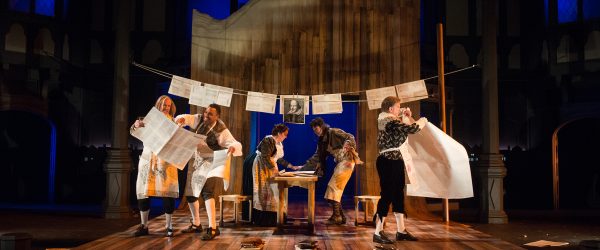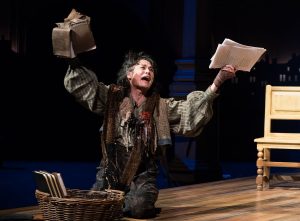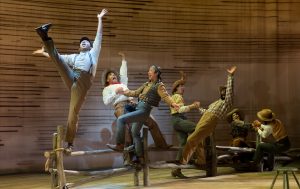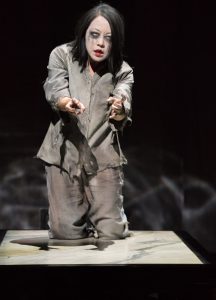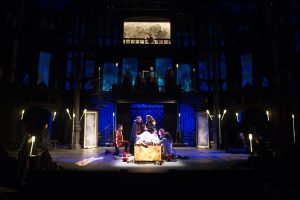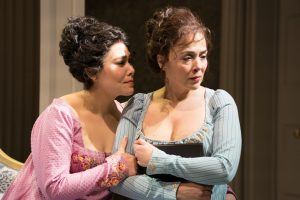“Most people would go to church, but you went… to the Globe”
These words from the The Book of Will (currently playing in the Allen Elizabethan Theatre) perfectly encapsulate the reverence with which the Oregon Shakespeare Festival treats the spoken word and how our stories are told.
Since 1935 when the festival began, OSF has striven to uphold its mission of “reaveal[ing] our collective humanity through illuminating interpretations of new and classic plays, deepened by the kaleidoscope of rotating repertory.” And boy howdy have they accomplished this and so much more in an exceedingly diverse and beautiful season.
The Book of Will (June 6 – October 12)
For a festival devoted to keeping the magic of words alive, there could not be a more apt tribute than The Book of Will by Lauren Gunderson. Our story begins three years after the death of William Shakespeare. The three surviving members of the King’s Men (the acting troupe of which Shakespeare was a member and that performed Shakespeare’s plays) are gathered in their favorite pub reliving and reveling in all the best moments they had acting what would become some of the most iconic roles in all of theater.
These “lions of the boards” are Henry Condell played with a frenetic, and seemingly indefatigable energy by David Kelly, John Heminges brought to life by Jeffrey King as a careful and earnest caretaker of Shakespeare’s legacy, and finally Kevin Kenerly as Richard Burbage who makes such an indelible impression in this first scene as a titan of the stage that it is no surprise that his (spoiler alert) almost immediate death is the impetus for the action of the play (don’t worry, he comes back as the conniving William Jaggard).
Working beside these compelling men is a cast of strong and capable women equally invested in the works of Shakespeare. It is evident from the first moments that, even though they will never get to perform the roles on stage, they know every word and can (and do) recite them along with the men. Catherine Castellanos brings a warmth and intelligence to both the quick-witted Elizabeth Condell and enigmatic Emilia Bassano Lanier. In her role as Alice, Kate Hurster is commanding and determined as a woman must be working in a man’s world. Lastly, Kate Mulligan as Rebecca Heminges and Anne Hathaway exudes kindness and compassion that seem to come from her very pores.
Spurred on by the death of Burbage, Condell and Hemings (aided and inspired by their wives and daughter) embark on the incredible task of publishing the complete works of William Shakespeare in folio form. This brings to the surface questions of why do we bother? Why are these words so important? And it answers with the greatest Shakespeare mixtape of all time.
Oklahoma! (April 18 – October 28)
As one of the most talked about and publicized productions of the season, expectations were high going into this production of the classic Rodgers and Hammerstein musical Oklahoma!. Director Bill Rauch (also the Artistic Director of the festival itself) states in the playbill that he has had this concept of producing this show with leading same-sex couples “hibernating in his heart” for almost 30 years and now it explodes onto the Angus Bowmer Theatre fully formed and full of hope.
When Oklahoma! originally premiered in 1943, it was the innovative masterpiece of its time. Based on the play Green Grow the Lilacs, it follows the love triangle of Curly McLain, Laurey Williams, and Jud Fry as well as the budding romance of Will Parker and Ado Annie (reworked as Andy for our purposes). Both of these stories are set against the backdrop of the fledgling state of Oklahoma and its adventurous settlers.
While the new lense through which we have to view this traditional story is as groundbreaking as the original musical was in its day, it is backed up by some truly stellar performances. Leading this rowdy band of misfits is Tatiana Wechsler as the cowhand Curly. She is all swagger and confidence and has such an easy belt it is hard to imagine Richard Rogers didn’t write Curly’s songs just for her. As Laurey Williams, the dreamy farm girl, is Royer Bockus who brings such an original, almost goofy energy to what can be a flat and stereotypical ingenue role. Her voice is sweet and bright and though she shines with her clear soprano, she navigates easily throughout her register.
Our secondary lovers, Will and Ado Andy, are played by the dynamic duo of Jordan Barbour and Jonathan Luke Stevens respectively. Barbour has an easy charm and charisma which goes perfectly with the flirty and frisky Stevens. One of the biggest surprises was Michael Sharon as the antagonist Jud Fry. Sharon brings extreme depth to what can often be seen as a black hat wearing villain. As the town outcast, he is the only one clinging to traditional gender roles in this varied and accepting utopia.
Filling out the world on the farm is Bobbi Charlton as Aunt Eller who brings a brusque kindness and a commanding presence, and K. T. Vogt as Ma Carnes under whom no line escapes without being mined for every ounce of comedy. The ensemble is diverse and lively. The group numbers are so explosive and joyful they seem barely contained on the Angus Bowmer stage – maybe not even by the city of Ashland. The new orchestrations by Ethnomusicologist/Orchestrator Amy Wooley are beautiful and the play between the incredibly adept musicians under the baton of Daniel Gary Busby and the actors onstage is just plain fun.
While the swapping of genders could be seen as a gimmick, it actually serves to bring a whole new light to this beloved musical. Each line is imbued with new meaning. As Curly says towards the end of the play we’ve all got to “keep up ‘th the way things is goin’ in this here crazy country!” (A line which elicits a big and knowing cheer from the audience.) Even with all the changes and innovations in this production, it still ends happily ever after though, this time, under a rainbow moon.
Snow in Midsummer (August 2 – October 27)
From the first lines of Frances Ya-Chu Cowhig’s Snow in Midsummer (based on the classical Chinese drama The Injustice to Dou Yi that Moved Heaven and Earth by Guan Hanqing) it is clear that, as the audience, we are part of this story. Dou Yi addresses the audience directly with an introductory prologue.
We fast-forward three years and land right into the middle of a ghost story/mystery/soap opera. Ever since the young widow Dou Yi cursed the town while being wrongly executed, New Harmony has been dealing with a crippling drought. Cue the arrival of Tianyun, a businesswoman and her adopted daughter Fei-Fei. All seems to be copacetic with business deals and wedding engagements until Fei-Fei is taken over by the restless spirit of Dou Yi. It becomes a race to uncover the truth and bring justice to Dou Yi before disaster comes to Fei-Fei and the town of New Harmony.
The performances, which are extraordinary, are one of the elements that serve to make clear what could be a confusing or complicated story. The two women at the heart of the story put forth nuanced and complex characters. Jessica Ko as the falsely accused Dou Yi, is able to pivot effortlessly between a naive innocence and the cold, imposing spirit she becomes in the second act. Amy Kim Waschke shows a similar progression of Tianyun. She begins with an easy confidence and buttoned up control as one very used to being the boss. She becomes progressively unhinged and unsure.
The design team of Laura Jellinek (Scenic Designer), Helen Q. Huang (Costume Designer), Jane Cox (Lighting Designer), and Tei Blow (Composer and Sound Designer) and Director Justin Audibert add more ingredients that help to tell this intricate tale. In a flashback to the execution of Dou Yi, the house lights are up and she is addressing the audience directly. We were all complicit in her wrongful death. As stated late in the play, “Nobody’s innocent”.
Romeo and Juliet (June 5 – October 12)
For never was a story of more woe
Than this of Juliet and her Romeo.
In this heartbreaking production of Romeo and Juliet, director Dámaso Rodríguez has taken every opportunity to fulfill this final couplet. With a story so ubiquitous and one of the most famous endings in all of theater, the challenge comes in keeping the story relevant and the themes effective. Many different interpretations and settings have been employed to keep this classic play meaningful. Rodríguez keeps the inspiration for the costumes (exquisitely executed by Leah Piehl) and set (impeccably done by Efren Delgadillo, Jr.) firmly in the late 15th and early 16th century but there are distinct modern elements sprinkled throughout. This brings the familiar tale into the present and makes the parallels to the divisive and acrimonious climate which has become pervasive in our country very easy to draw.
All of the dazzling sets and costumes would be nothing without a cast that could truly deliver. William Thomas Hodgson as Romeo is impressive throughout however the more distraught and desperate Romeo gets, the more Hodgson shines. As Juliet, Emily Ota is a rush of adolescent hormones and emotions moving easily between elation and devastation. Aiding our lovers are Friar Laurence and Nurse played by Michael J. Hume and Robin Goodrin Nordli respectively. Both are veterans of the festival and always manage to bring Shakespeare’s language to life in new and extraordinary ways. A very special shout-out to Sara Bruner as Mercutio. In her hands, the often problematic Queen Mab speech is a virtuosic aria. She is dynamic and infinitely charismatic making her friendship with Romeo authentic and her death tragic.
Throughout the production, the entire cast acts as the chorus watching on as the most harrowing plot points unfold before them. Each character is complicit and has their own role in the violence and anguish. They all join in on the hate and enmity thinking that their actions will have no consequences. In the end, they are all forced to confront the very real aftermath of their prejudice.
Sense and Sensibility (February 17 – October 28)
Jane Austen’s first novel Sense and Sensibility has been adapted many times for screens both large and small as well as the stage. Kate Hamill’s rendition currently playing in the Angus Bowmer Theatre takes its rightful place among the best of them as a delightful and enchanting exploration of love, honor, and family.
The story rotates around the Dashwood sisters who, after the death of their beloved father, find themselves at the mercy of their relatives. Forced out of their home by their pushover of a half-brother (Brent Hinkley) and his shrill and haughty wife (Amy Newman) they must move onto the property of some very well meaning cousins into a very modest cottage. What follows is a rush of romance, heartbreak, secret engagements, and a healthy amount of pining.
While at the surface, this appears to be a straightforward romance, at its heart, it is a love story between two sisters. Nancy Rodriguez as Elinor Dashwood and Emily Ota as Marianne Dashwood are the true heart of this play. Rodriguez, as the eldest sister, is reserved and composed throughout most of the play but it is always clear there are complex emotions bubbling just below the surface. The scenes between her and the endearingly shy Edward Ferrars (played by Armando McClain) are almost physically painful with what is unsaid pushing apart two people who clearly want to be together. Ota, as the younger and much more impetuous sister, is engaging and captivating. She brings a brilliant, ever-moving physicality to the role of a young girl who is continually unable to contain her energy and passion.
As in all of Austen’s works, the world is populated with some extreme characters and this adaptation does not disappoint. With 10 actors playing 27 parts, the universe of 1790s England is rich and varied. K.T. Vogt as Mrs. Jennings and Michael J. Hume as Sir John Middleton are instantly warm and inviting and hilarious. As the youngest Dashwood sister Margaret, Samantha Miller exudes a natural and grounded charm. Brent Hinkley completely disappears into such a diverse array of roles (all incredibly entertaining) it is only after checking the program you realize how much you actually saw of him.
Condensing a full length novel into a manageable 2 ½ hour play is no small feat. However, thanks to the clever adaptation by Kate Hamill and the skilled staging of Director Hana S. Sharif the storytelling is clear, the plot is engaging, and the play completely satisfying.


